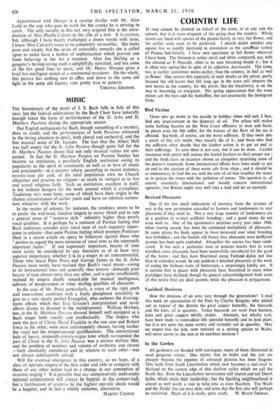MUSIC
THE bicentenary of the death of J. S. Bach falls in July of this year, but the festival celebrations by the Bach Choir have naturally enough taken the form of performances of the St. John and St. Matthew Passions during the appropriate season.
Our English enthusiasm for Bach, though something of a mystery, does us credit, and the performances of both Passions witnessed to the loving attention to detail, both choral and orchestral, and the fine musical sense of Dr. Jacques. The fact that the Albert Hall was half empty for the St. John Passion though quite full for the St. Matthew Passion shows that not only musical values are con- cerned. In fact the St. Matthew Passion on Passion Sunday has become an institution, a peculiarly English institution owing its popularity to the spirit of community as well as to love of music and presumably—in a country where, according to recent statistics, seventy-nine per cent. of the total population own no Church allegiance and practise no religion—as much to vestigial as to live and actual religious faith. Such an institution, excellent in itself, is not without dangers for the work around which it crystallises. Traditions very soon form, some of which have their origin in the chance circumstances of earlier years and have no intrinsic connec- tion whatever with the work.
In the matter of soloists, for instance, the tendency seems to be to prefer the well-tried, familiar singers to newer blood and to rate a general sense of " oratorio style " infinitely higher than • purely vocal qualities. It is perhaps by a remnant of Puritan feeling that Bach audiences consider pure vocal tone of such nugatory impor- tance in soloists—that same Puritan feeling which prompts Professor Dent in a recent article on opera to fulminate against those who " profess to regard the mere emission of vocal tone as the supremely important factor." If not supremely important, beauty of tone must surely be considered by• any musician as of at least very superior importance, whether it is in a singer or an instrumentalist. Those who heard Peter Pears and George James in the St. John Passion must surely have realised that Bach's vocal music—owing to its instrumental lines and generally thin texture—demands pure beauty of tone almost more than any other, and is quite insufficiently realised by singers chiefly remarkable for musical intelligence, sobriety of temperament or other sterling qualities of character.
In the case of Mr. Pears particularly, a voice of the right pitch and tone-colour combines with a finely disciplined sensibility to give us a very nearly perfect Evangelist, who eschews the drawing- room effects which mar Eric Greene's interpretation and never allows drama to descend to the melodramatic. William Herbert, too, in the St. Matthew Passion showed himself well equipped as a Bach singer both vocally and intellectually. The singers who took the part of Christ, David Franklin in the one case and Robert Irwin in the other, were most unfortunately chosen, having neither the vocal nor the temperamental qualifications. The conventional halo of heavy, ninteenth-century-organ tone which surrounded the part of Christ in the St. John Passion was a serious stylistic blot, and the problem of numbers and volume of orchestra and chorus —both absolutely considered and in relation to each other—was not always satisfactorily solved.
Will the eventual emergence in this country, as we hope, of a class of operatic singers of the first order and able to compare with those of any other nation lead to a change in our conception of oratorio singing ? It is possible that our comparatively undramatic national temperament will always be happier in the concert-hall, but a fertilisation of oratorio by the highest operatic ideals would be a happier, and in fact a wholly welcome, alternative.
MARTIN COOPER.






































 Previous page
Previous page